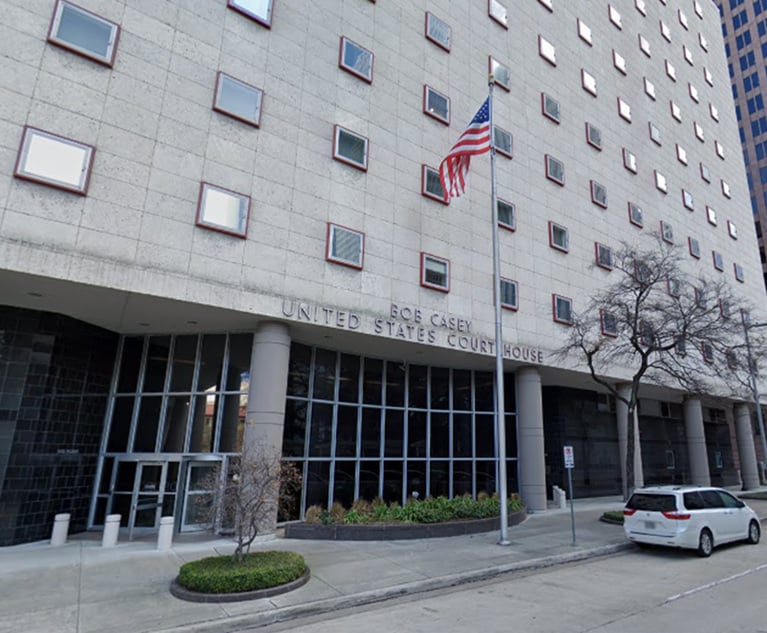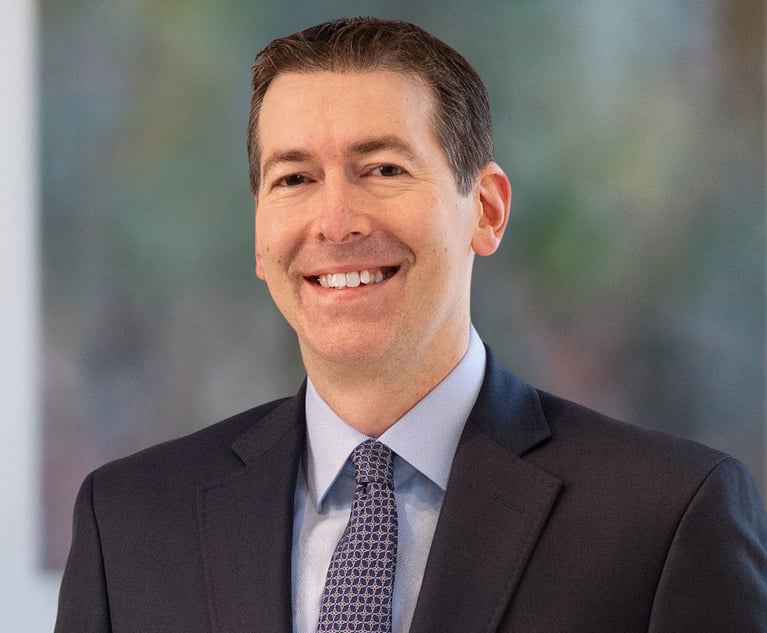The Regulator Whisperers: Covington & Burling, Finalist for White Collar/Regulatory Litigation Department of the Year
Covington uses its knowledge of—and respect for—the U.S. Department of Justice to win big for clients.
December 20, 2017 at 10:58 PM
4 minute read
 (l-r) Eric Holder Jr., Steven Fagell, Lanny Breuer, Nancy Kestenbaum, and Mythili Raman, of Covington & Burling, one of the overall finalists for Litigation Departments of the Year for the January issue of The American Lawyer magazine. November 1, 2017. (Photo: Diego M. Radzinschi)
(l-r) Eric Holder Jr., Steven Fagell, Lanny Breuer, Nancy Kestenbaum, and Mythili Raman, of Covington & Burling, one of the overall finalists for Litigation Departments of the Year for the January issue of The American Lawyer magazine. November 1, 2017. (Photo: Diego M. Radzinschi)
In the judge's robing room, Covington & Burling partner Nancy Kestenbaum could sense they had made an impression.
It was March 2017 at a federal courthouse in New Jersey and Kestenbaum and her co-counsel, former Secretary of Homeland Security Secretary Michael Chertoff, were trying to keep David Samson out of jail. Samson had resigned as chairman of the Port Authority of New York and New Jersey after getting caught up in the criminal investigation into the politically motivated move by Gov. Chris Christie's aides to close lanes on the George Washington Bridge. He avoided charges directly related to the so-called Bridgegate scandal.
But when the investigation morphed into a bribery probe centering on the "chairman's flight"—his name for a United flight between Newark and South Carolina that accommodated Samson's weekend trips to a vacation home—damning email evidence prompted Samson to plead guilty in 2016 to using his influence to force the airline to reinstate his cherished flight. As part of the plea deal negotiated by Covington, Samson faced a government push for him to serve two years.
Making the case for a lighter sentence, Chertoff pointed to Samson's long career of public service, which he argued was blemished by a single lapse.
"I realized that we were able to paint the picture," Kestenbaum says, "and bring to life the actual human that was Mr. Samson, not the villain that had, somewhat, been portrayed in the press." Samson was sentenced to a year of house arrest at his South Carolina home and four years of probation.
Samson's sentencing was just one of the many high-profile cases in which Covington secured favorable outcomes for clients, often in an emotionally charged climate. For instance, when Uber Technologies Inc. was faced with allegations of a toxic corporate culture, it hired former U.S. Attorney General Eric Holder Jr., a partner at the firm, for help. Holder's report was transformative for the company, recommending closer board oversight, better training and "a robust and effective complaint process."
Department Size and Revenue Partners: 54 Associates: 65 Counsel: 30
Department as Percentage of Firm: 17.6%
Percentage of Firm Revenue, 2016: Would not disclose
Covington's understanding of the workings of the Justice Department was put to work to score favorable resolutions for clients. When confronted with criminal charges over its airbag scandal, Takata Corp. turned to Covington to negotiate a plea deal that reflected its position in the market and would allow it to continue operating.
"In Takata, it was a complicated and stressful situation," says Covington partner Lanny Breuer, a former assistant attorney general for the criminal division. "It was important that the department came to rely upon us, to believe—accurately—we were in fact digging deep, revealing the facts and being understandable." When the deal was finalized, prosecutors praised Covington's full cooperation on behalf of Takata.
Behind the scenes, the firm's white-collar specialists scored declinations from the Justice Department, namely in a years-long foreign bribery investigation into the beverage giant AB InBev's efforts in India. The company, represented by Covington's Breuer and Steven Fagell, reached a settlement with the Securities and Exchange Commission, but without admitting or denying allegations that it violated the accounting provisions of the Foreign Corrupt Practices Act.
Covington is poised to stay in the spotlight into 2018. On Dec. 1, President Donald Trump's former national security adviser Michael Flynn pleaded guilty to one count of lying to the FBI about calls with the Russian ambassador during the transition, in a plea deal negotiated by Covington partners Robert Kelner and Stephen Anthony.
This content has been archived. It is available through our partners, LexisNexis® and Bloomberg Law.
To view this content, please continue to their sites.
Not a Lexis Subscriber?
Subscribe Now
Not a Bloomberg Law Subscriber?
Subscribe Now
NOT FOR REPRINT
© 2025 ALM Global, LLC, All Rights Reserved. Request academic re-use from www.copyright.com. All other uses, submit a request to [email protected]. For more information visit Asset & Logo Licensing.
You Might Like
View All
Am Law 100 Lateral Partner Hiring Rose in 2024: Report

JCPenney Seeks Return of More Than $1.1M From Jackson Walker For Bankruptcy Work
3 minute read
Orrick Hires Longtime Weil Partner as New Head of Antitrust Litigation

Trending Stories
- 1Gunderson Dettmer Opens Atlanta Office With 3 Partners From Morris Manning
- 2Decision of the Day: Court Holds Accident with Post Driver Was 'Bizarre Occurrence,' Dismisses Action Brought Under Labor Law §240
- 3Judge Recommends Disbarment for Attorney Who Plotted to Hack Judge's Email, Phone
- 4Two Wilkinson Stekloff Associates Among Victims of DC Plane Crash
- 5Two More Victims Alleged in New Sean Combs Sex Trafficking Indictment
Who Got The Work
J. Brugh Lower of Gibbons has entered an appearance for industrial equipment supplier Devco Corporation in a pending trademark infringement lawsuit. The suit, accusing the defendant of selling knock-off Graco products, was filed Dec. 18 in New Jersey District Court by Rivkin Radler on behalf of Graco Inc. and Graco Minnesota. The case, assigned to U.S. District Judge Zahid N. Quraishi, is 3:24-cv-11294, Graco Inc. et al v. Devco Corporation.
Who Got The Work
Rebecca Maller-Stein and Kent A. Yalowitz of Arnold & Porter Kaye Scholer have entered their appearances for Hanaco Venture Capital and its executives, Lior Prosor and David Frankel, in a pending securities lawsuit. The action, filed on Dec. 24 in New York Southern District Court by Zell, Aron & Co. on behalf of Goldeneye Advisors, accuses the defendants of negligently and fraudulently managing the plaintiff's $1 million investment. The case, assigned to U.S. District Judge Vernon S. Broderick, is 1:24-cv-09918, Goldeneye Advisors, LLC v. Hanaco Venture Capital, Ltd. et al.
Who Got The Work
Attorneys from A&O Shearman has stepped in as defense counsel for Toronto-Dominion Bank and other defendants in a pending securities class action. The suit, filed Dec. 11 in New York Southern District Court by Bleichmar Fonti & Auld, accuses the defendants of concealing the bank's 'pervasive' deficiencies in regards to its compliance with the Bank Secrecy Act and the quality of its anti-money laundering controls. The case, assigned to U.S. District Judge Arun Subramanian, is 1:24-cv-09445, Gonzalez v. The Toronto-Dominion Bank et al.
Who Got The Work
Crown Castle International, a Pennsylvania company providing shared communications infrastructure, has turned to Luke D. Wolf of Gordon Rees Scully Mansukhani to fend off a pending breach-of-contract lawsuit. The court action, filed Nov. 25 in Michigan Eastern District Court by Hooper Hathaway PC on behalf of The Town Residences LLC, accuses Crown Castle of failing to transfer approximately $30,000 in utility payments from T-Mobile in breach of a roof-top lease and assignment agreement. The case, assigned to U.S. District Judge Susan K. Declercq, is 2:24-cv-13131, The Town Residences LLC v. T-Mobile US, Inc. et al.
Who Got The Work
Wilfred P. Coronato and Daniel M. Schwartz of McCarter & English have stepped in as defense counsel to Electrolux Home Products Inc. in a pending product liability lawsuit. The court action, filed Nov. 26 in New York Eastern District Court by Poulos Lopiccolo PC and Nagel Rice LLP on behalf of David Stern, alleges that the defendant's refrigerators’ drawers and shelving repeatedly break and fall apart within months after purchase. The case, assigned to U.S. District Judge Joan M. Azrack, is 2:24-cv-08204, Stern v. Electrolux Home Products, Inc.
Featured Firms
Law Offices of Gary Martin Hays & Associates, P.C.
(470) 294-1674
Law Offices of Mark E. Salomone
(857) 444-6468
Smith & Hassler
(713) 739-1250










